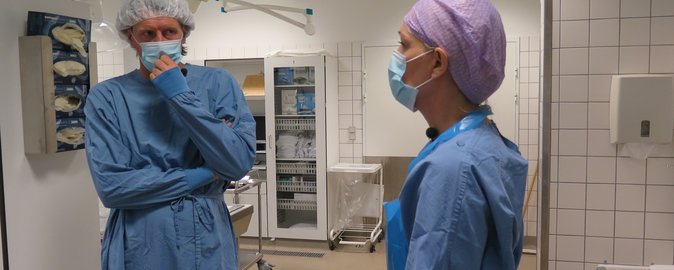- Education
-
Research
Current research
Talent
-
Collaboration
Businesses
Government agencies and institutions
Alumni
-
About AU
Organisation
Job at AU
For the first time, the Department of Forensic Medicine in Aarhus has allowed a television crew to follow a working day at the section rooms
2015.11.09 |

Journalist Anders Agger follows medical specialist Marianne Cathrine Rohde from Department of Forensic Medicine in Aarhus in the program DR Inside. FOTO: DR.
The camera follows medical specialist in forensic medicine Marianne Cathrine Rohde while she moves around the dissection table and dictates information for the medical journal. The camera catches some short glimpses of the deceased on the table while the doctor speaks into her Dictaphone. An everyday situation for the forensic pathologist, but for TV viewers it is a rare insight into the work of forensic pathology.
The scene comes from an episode of the series DR Indefra (DR Inside), and it was filmed at the Department of Forensic Medicine at Aarhus University. The series is currently being shown on the Danish TV channel DR2, and the episode from the department will be aired on Monday 9 November.
It is the first time the department has opened the doors to the section rooms and allowed a camera crew to follow the work being done on the steel tables, which most Danes only know about from crime programmes.
A crucial factor in the decision to take part in the programme was that it is produced by DR, with the journalist Anders Agger as the interviewer. This is the view of Marianne Cathrine Rohde, who is the forensic pathologist we follow most closely in the programme.
"We have previously refused to take part in TV programmes because we haven’t been able to vouch for them ethically and objectively. We said yes to DR because they had a concept we could see ourselves taking part in," says Marianne Cathrine Rohde.
Before the programme was recorded there was a long planning process with lots of discussions – both internally at the department and with the producers of the programme. The thorough preparation was essential for establishing trust between the television people and us, says Christian Lindholst, department head at the Department of Forensic Medicine.
"What we wanted to do in general terms was tell the public about the department's tasks and the importance of forensic medicine and forensic chemistry for disease prevention and legal rights in our society. But there was also considerable scepticism about letting TV cameras into the department. A scepticism which also has to do with protecting the people we examine at the department. In our view, this has always been incompatible with filming a TV programme," says Christian Lindholst.
That an agreement with DR Indefra has nevertheless been reached is due to an on-going dialogue with DR before, during and after the filming. Together with a very long and very detailed contract between DR and AU.
"The contract provided a clear framework with specific agreements on which situations the TV cameras should withdraw from, declarations of consents and anonymisation, but it didn’t replace the on-going discussion we had with the production team. We respected the premise that DR had the editorial rights. On the other hand, we’ve experienced a great deal of responsiveness to and interest in understanding the pride, respect and deep professionalism that characterises the department. That’s also what we see being communicated in the finished programme," says Christian Lindholst.
During the programme, journalist Anders Agger follows medical specialist Marianne Cathrine Rohde as she rinses organs at the steel sink while dressed in a blue operation gown, sits in an official car on the way to examine a person, and is at home with the duty telephone. This is the first time a Danish TV programme gets this close to the core activities of a forensic pathologist. Marianne Cathrine Rohde found her own opinion about what was acceptable changed as filming progressed.
"At the first meeting with DR I wasn’t even aware that they would be filming inside the department. But to tell a story about forensic medicine, they have to film what we do. That’s why the programme has the word inside in it’s title,” she explains.
Marianne Cathrine Rohde is prepared for the fact that some people may find the show overwhelming and perhaps stark. But she also hopes that viewers will see the meaningful aspect of forensic work. She thinks it will be beneficial to shed some light on what takes place at the forensic medicine department.
"In our experience, relatives want to be informed of what we’re actually doing with their loved ones. Even if this is associated with great sadness and accidents. So in many ways we help with a form of clarification. That’s the story we would like to tell."
DR Indefra with Anders Agger will be broadcast on the Danish television channel DR2 on Monday 9 November at 20:45.
Department Head Christian Lindholst
Tel.: (+45) 8716 8331
Medical Specialist in Forensic Medicine Marianne Cathrine Rohde
Tel.: (+45) 8716 8319